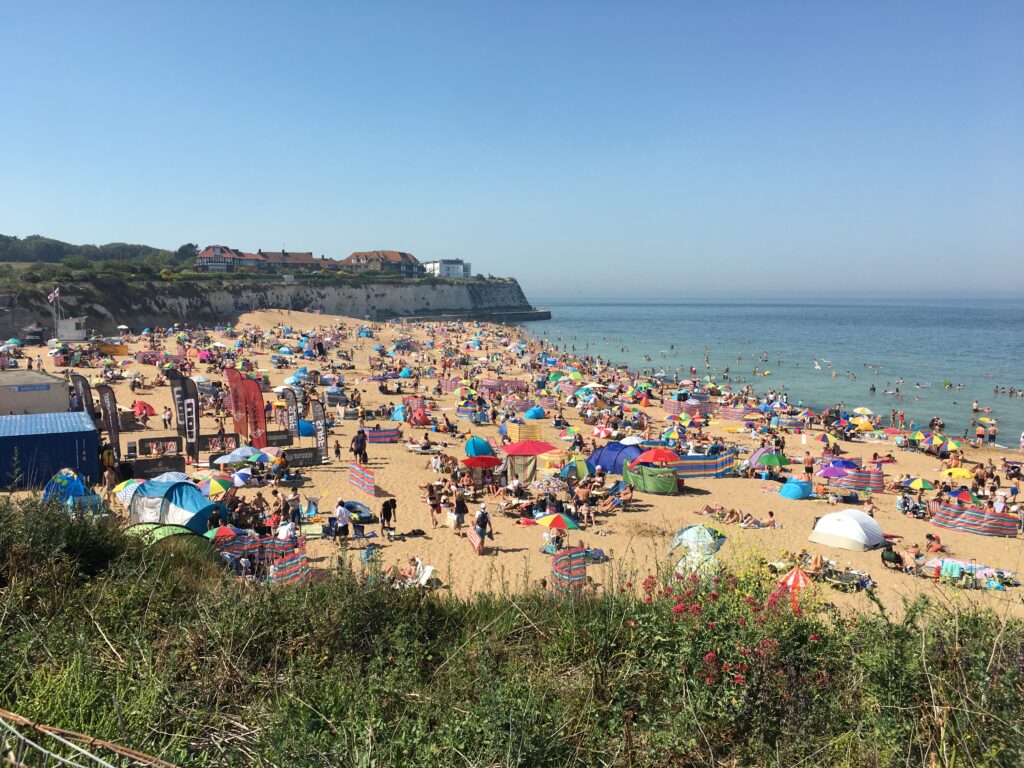

On Monday the Prime Minister, Boris Johnson, happily announced a tranche of relaxations of England’s lockdown restrictions, to be timed for 4 July. The public weren’t going to wait, flocking to the country’s beaches to take advantage of a few days of sunshine. I took the first picture here in Broadstairs, Kent on 31 May, thinking it was crowded (we had become used to this beach being deserted), but look at yesterday by comparison. The country seems to be making a dash for normality. Disappointment lies ahead.
The relaxations come after some hefty lobbying by businesses, who are experiencing huge strains. They highlight a legitimate concern, as many jobs are under threat as businesses face the danger of folding. Public finances are under strain too, though by how much and why remains a matter for debate. But the problem is a deadly virus for which there is no vaccine or cure, not overzealous lockdown regulations. So if you don’t want to risk catching the disease, and the prospect of a horrible death, just how safe are you being made to feel? The country is dividing on this question.
I have heard quite a few lobbyists for the hospitality industry on the radio. For the most part they do not inspire confidence. They are anxious to abolish the two-metre social distancing rule, but are reluctant to explain how they can still be safe. Some of them even grumble about the idea that they would have to keep records of all those attending their establishments, even though this is an obvious quid quo pro to relaxing distancing requirements in the high-risk settings that most of them obviously run. One expert offered a list of potential mitigations for reduced distancing: not facing people, masks, reducing time of contact, low noise levels so that people can talk softly. Not much of this helps if you are indoors in a pub or restaurant, although if customers are seated at tables only with members of their isolation group, then at least you won’t be facing others. To be fair some hosts on television are doing a better job of explaining themselves: instead of whinging about the rules they are showing viewers all the precautions they are taking to make people feel safe.
But a lot of people don’t really care. They are fed up with confinement, and note the reduced prevalence of the disease, and therefore the reduced risk of catching it. Many are younger and fitter people who feel less at risk of suffering badly. Many also draw confidence from other countries where restrictions have been relaxed. They miss two aspects of these overseas examples. First is that in the more successful countries they applied relaxation after they had beaten back the disease further than England has, and that even then they have had to identify and manage local outbreaks. And England’s track and trace infrastructure inspires little confidence that it is up to this task. The second is that in other countries that have relaxed (notably in some states of the USA), they are moving headlong into a relapse. Two things about the epidemic strain our intuitive way of understanding the world. First is the time lag between picking up the disease and diagnosing it, then between diagnosis and hospitalisation, and finally between hospitalisation and death. The second is the exponential nature of the spread, and the way a small number moves very rapidly to a big one and so the need to intervene when it feels too early. This is what led to some countries failing to take the disease seriously enough until too late. It is clear that the US President Donald Trump, ever the intuitive leader, struggles with both these things.
But while one, very conspicuous, group are making a headlong dash for normality, another, usually older and more vulnerable, group remain very frightened. They are staying indoors, so remain nearly invisible. But this applies to my household and many others that I know. This is both good and bad news. The good news is that if this group stays out of trouble, then the most vulnerable people will be protected, keeping hospitalisations and death rates down. The bad news is that this large number of often quite high-spending people will not be the free-spending agents needed for a full economic recovery. And if infection rates start to rise, they will become even more scared.
All of which gives an impressive of a government that doesn’t think things through. If it wanted to tempt older people back into shops and other facilities it needed to work a bit harder to reassure them. The words are there but the body-language isn’t. For example the government says that the 2-metre rule is replaced by “one-metre plus”. The plus is meant to suggest alternative mitigation, and yet this has been totally drowned out in the messaging. If it had been combined with a clear directive for people to wear face coverings in virtually all indoor settings, then it might have been easier to convey this. Instead they promote the idea that the risks are reduced so you don’t need precautions like masks; of course they don’t say that, but observing people around me that seems to be what is happening. And the problem about masks is that everybody needs to wear them for it to work. It is no use if just the worried people do.
Still, the government has probably bought itself a month or two before any obvious problems emerge. And then it looks likely to face a twin threat. A faltering economy as the worried sit on their savings while government support schemes, like furlough funding, run their course. And rising infection rates working their way slowly but surely through the system, beyond the country’s capacity to contain it on a local level. I really hope I’m wrong.

